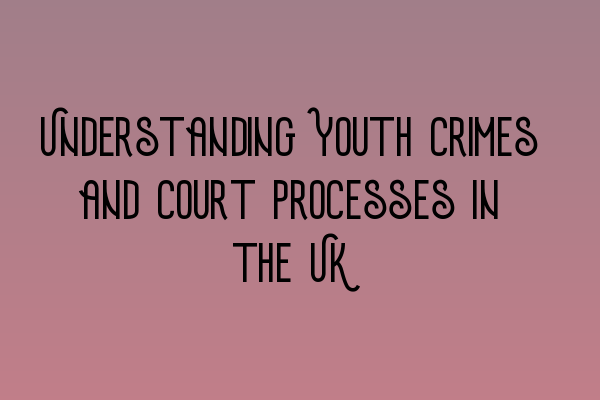Understanding Youth Crimes and Court Processes in the UK
As solicitors at SQE Criminal Law & Practice Law UK, we understand the importance of comprehending the nuances of youth crimes and court processes in the UK. Dealing with legal matters involving young individuals requires specialized knowledge, sensitivity, and expertise.
What are Youth Crimes?
Youth crimes, also known as juvenile crimes, refer to offenses committed by individuals who are under the age of 18. These offenses can range from vandalism and theft to more serious crimes such as drug offenses or violent acts.
It is crucial to understand that the legal system treats young offenders differently than adult offenders. The aim is not only to hold them accountable for their actions but also to rehabilitate and reintegrate them into society.
The Court Process for Youth Crimes
When a young person is accused of committing a crime, they will go through a specific court process designed for youths. This process aims to provide them with the necessary support and opportunities for rehabilitation.
1. Arrest and Police Interview
If a young person is suspected of committing a crime, they may be arrested by the police. During the interview, a solicitor may be present to protect the rights and interests of the young person.
2. Bail or Remand
After the arrest, the court will decide whether the young person should be granted bail or held in custody until their trial. The court considers factors such as the seriousness of the offense, flight risk, and the welfare of the young person.
3. First Court Appearance
The young person will appear in the youth court for their first hearing. This hearing determines the course of action, such as whether the case should proceed to trial or be resolved through alternative resolutions, such as cautioning or reparation.
To prepare for your SQE exams, consider exploring our SQE 1 Practice Exam Questions and SQE 1 Practice Mocks FLK1 FLK2 articles.
4. Pre-Trial Proceedings
If the case proceeds to trial, there will be pre-trial proceedings where evidence is disclosed, witnesses are interviewed, and both the prosecution and defense prepare their respective cases.
5. Trial
The trial in the youth court involves presenting evidence, examination and cross-examination of witnesses, and legal arguments. The judge or panel of magistrates determines guilt or innocence based on the evidence provided.
For comprehensive SQE 2 preparation courses, visit our SQE 2 Preparation Courses page.
6. Sentencing
If the young person is found guilty, the court will proceed to sentencing. The aim of sentencing is to provide appropriate punishment, rehabilitation, or support services tailored to the needs of the young person.
7. Appeals
If there are grounds for appeal, the young person or their legal representation can lodge an appeal against the conviction or the sentence. The appeal process varies depending on the nature of the case and the court in which the trial was conducted.
To enhance your SQE 1 preparation, we offer comprehensive SQE 1 Preparation Courses tailored to help you excel in your exams.
Conclusion
Understanding youth crimes and court processes is essential for anyone working in the field of criminal law. At SQE Criminal Law & Practice Law UK, we have the expertise and experience to navigate the complexities of youth cases with the utmost professionalism and compassion.
Stay updated with the latest SRA SQE Exam Dates to ensure you are well-prepared for your upcoming SQE exams.
